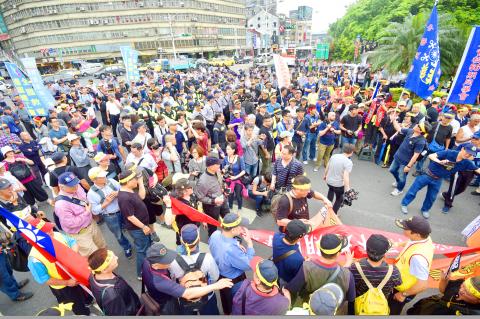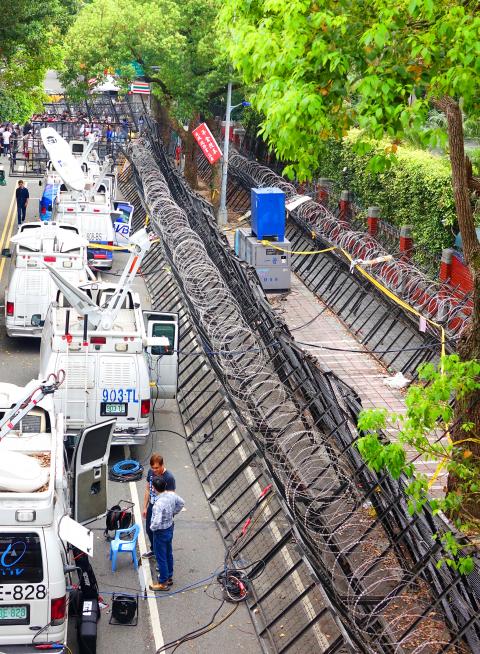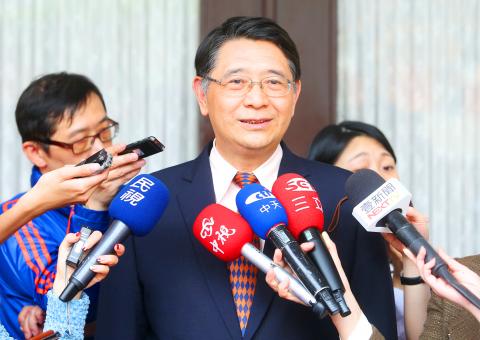Barricades placed outside the Legislative Yuan are to remain amid security concerns over ongoing pension reform protests and intelligence reports that agitators, including former special forces personnel, might use smoke bombs and attack officers, a legislative official said yesterday.
Citing intelligence provided to the legislature on Monday afternoon by National Police Administration (NPA) Director-General Chen Kuo-en (陳國恩), Legislative Yuan Secretary-General Lin Chih-chia (林志嘉) said that some protesters might take aggressive action aimed at causing bodily harm.
Many of the protesters are suspected to be retired police officers and military personnel, Lin quoted Chen as saying.

Photo: Huang Yao-cheng, Taipei Times
The agency believes there is a higher risk of police being attacked in the ongoing protest compared with previous pension reform protests — including the one on March 29 in which 22 officers were injured during clashes, Lin said.
Lin said the agency is taking the current protest seriously because the demonstrators are not ordinary citizens or young people, such as those who participated in the 2014 Sunflower movement.
The security measures are aimed at guaranteeing that the legislature can function normally, Lin said, adding that the agency is asking lawmakers and the media to bear with the situation.

Photo: Liu Hsin-de, Taipei Times
Lawmakers are set to review pension reform proposals for public servants today and tomorrow.
The planned legislative review attracted a new wave of demonstrations yesterday by civic groups composed of public servants, teachers and military personnel that was organized by the Pension Reform Oversight Alliance, which staged what it called a “Besiege the Legislative Yuan” protest.
Lin said the legislature decided to keep the barricades after a meeting on Monday between Legislative Speaker Su Jia-chyuan (蘇嘉全) and Chinese Nationalist Party (KMT) caucus convener Sufin Siluko (廖國棟) and caucus secretary-general Alicia Wang (王育敏).

Photo: CNA
Lin said Sufin Siluko and Wang told Su that they were “troubled” by the wire barricades placed in the general area of the legislature.
Su assured the lawmakers that no barricades are to be placed within the legislature’s premises, but security outside the site is under the jurisdiction of the Taipei City Government and the police agency, Lin said.
Su said that if the KMT could convince protesters to pledge that they would not resort to violence, charge the legislature or clash with police, he would ask the NPA to reduce security levels in the area, Lin said.
As Su did not receive any message from the KMT caucus, the legislature could only conclude that the pledge was not forthcoming, Lin said.
Separately yesterday, Taipei Police Department Commissioner Chiu Feng-kuang (邱豐光) told city councilors during a question-and-answer session that about 2,000 police officers are to be deployed at the protest — 1,500 from the Taipei Police Department and 500 from the NPA.
Obstacles deployed include 1,248 sets of wire knife-rests, 230 rolls of concertina wire, 670 large-sized fences, 680 pedestrian barriers, 14 wire-laying vehicles and four vehicles with mounted floodlights, Chiu said, adding that no other special vehicles or water cannon trucks are to be used.
Additional reporting by CNA

AGING: As of last month, people aged 65 or older accounted for 20.06 percent of the total population and the number of couples who got married fell by 18,685 from 2024 Taiwan has surpassed South Korea as the country least willing to have children, with an annual crude birthrate of 4.62 per 1,000 people, Ministry of the Interior data showed yesterday. The nation was previously ranked the second-lowest country in terms of total fertility rate, or the average number of children a woman has in her lifetime. However, South Korea’s fertility rate began to recover from 2023, with total fertility rate rising from 0.72 and estimated to reach 0.82 to 0.85 by last year, and the crude birthrate projected at 6.7 per 1,000 people. Japan’s crude birthrate was projected to fall below six,

US President Donald Trump in an interview with the New York Times published on Thursday said that “it’s up to” Chinese President Xi Jinping (習近平) what China does on Taiwan, but that he would be “very unhappy” with a change in the “status quo.” “He [Xi] considers it to be a part of China, and that’s up to him what he’s going to be doing, but I’ve expressed to him that I would be very unhappy if he did that, and I don’t think he’ll do that. I hope he doesn’t do that,” Trump said. Trump made the comments in the context

SELF-DEFENSE: Tokyo has accelerated its spending goal and its defense minister said the nation needs to discuss whether it should develop nuclear-powered submarines China is ramping up objections to what it sees as Japan’s desire to acquire nuclear weapons, despite Tokyo’s longstanding renunciation of such arms, deepening another fissure in the two neighbors’ increasingly tense ties. In what appears to be a concerted effort, China’s foreign and defense ministries issued statements on Thursday condemning alleged remilitarism efforts by Tokyo. The remarks came as two of the country’s top think tanks jointly issued a 29-page report framing actions by “right-wing forces” in Japan as posing a “serious threat” to world peace. While that report did not define “right-wing forces,” the Chinese Ministry of Foreign Affairs was

PREPAREDNESS: Given the difficulty of importing ammunition during wartime, the Ministry of National Defense said it would prioritize ‘coproduction’ partnerships A newly formed unit of the Marine Corps tasked with land-based security operations has recently replaced its aging, domestically produced rifles with more advanced, US-made M4A1 rifles, a source said yesterday. The unnamed source familiar with the matter said the First Security Battalion of the Marine Corps’ Air Defense and Base Guard Group has replaced its older T65K2 rifles, which have been in service since the late 1980s, with the newly received M4A1s. The source did not say exactly when the upgrade took place or how many M4A1s were issued to the battalion. The confirmation came after Chinese-language media reported